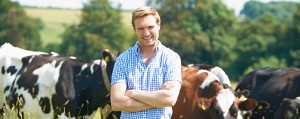
THE FRENCH
FOOD
INDUSTRY'S PORTAL
Webzine
taste it to info

COP21: APCA issues farmers with an educational leaflet
News /
Wednesday 23 December 2015
Agriculture naturally sustains a close working relationship with climate. The challenge of climate change for the agricultural sector is to work to reduce the impact of greenhouse gas (GHG) emissions and adapt to the changes and risks of a changing climate.
COP213, the 2015 Paris Climate Conference, came to a close on December 11 at Le Bourget conference centre, France. While France certainly didn’t wait for the conference to implement agroecology change, it is well aware that being able to feed the planet, in terms of both quantity and quality, is still a long way off. “A possible reduction (in greenhouse gases) of 10-20% is still possible between now and 2030 with a more efficient use of fertilisers, agroecological farming, the latest technology (digital in particular) and the development of bioeconomy (the conversion of biomass into renewable materials)” explains Jean-Marc Renaudeau, in charge of APCA’s Climate Energy programme.
To support the farming community and raise awareness that farmers can all take action to reduce the impact of global warming, APCA has published an educational leaflet* to this effect. To coincide with COP21, the leaflet was also created to inform the public and public institutions alike that farmers are firmly committed to protecting the climate. And they are in fact the first to be affected by climate change and global warming currently taking its course. “Above and beyond global warming, the change in conditions and vagaries of the climate, combined with the reaction of ecosystems, will change growing conditions for farmers, in France and throughout the world. It is important to look to the future and adapt to this new situation“ explains Jean-Marc Renaudeau.
Combining ecological and economical challenges
To implement these changes to the French agricultural sector, farmers must be assured that farming revenues will remain stable against a backdrop of economic crisis. The challenge is therefore to support farmers as they change their way of working. A multitude of options are possible, which all must work on a technical (precision agriculture or dripfeed irrigation for example), agronomical (agroforestry or planting covercrops), organisational (crop rotation or collective schemes to encourage planting hedgerows) and economical scale (new opportunities for renewable energies). This is a real challenge for farmers who benefit as a result from the support provided by chambres d’agriculture or local agricultural organisations.
Through this educational leaflet, which is modern in style and includes engaging illustrations, APCA tackles preconceived ideas surrounding climate change and encourages farmers to take action. So first on the list is the common view that “climate has always been changing so there is not much we can do”. The reality is that climate has indeed always been changing, influenced by many different factors including solar and volcanic activity. Today, what we are seeing is the speed and intensity of the changes observed compared to previous temperature variations, which equate to +1°C in France since 1900. The leaflet also contains 10 technical information sheets providing information on current solutions to improve your carbon footprint. Tangible case studies help illustrate how effective these solutions can be, including for instance planting hedgerows, cover planting or even covering manure pits to prevent ammonia emissions.
4,000 French dairy farms commit to the Life Carbon Dairy programme
To support these changes, chambres d’agriculture have also committed, by way of an example, alongside other players, to develop low carbon dairy farms as part of the Life Carbon Dairy project. Across 6 regions in France, advisors offer support to some 4,000 farms using diagnostic and monitoring tools to achieve reductions in GHG emissions, while maintaining, even improving, economic output. “This network of chambres d’agriculture, boosted by this expertise and a presence across the entire country, has made innovation a priority and insists on being at the very centre of renewed agricultural development policy, which provides solutions to tackle climatic change”, insists Jean Marc Renaudeau.
French agriculture commits for COP 21
Together with several partners including ADEME4, AFJA5 and CDC Climat6, APCA organised several events linked to climate change and the challenges facing agriculture, notably an international conference held 17 November 2015 that brought together farmers from five continents. It resulted in a common agreement adopted by agricultural organisations in preparation for COP21.
Notes
1APCA – Assemblee Permanente des Chambres d’Agriculture, overarching federation overseeing agricultural structures in France. *Click here to download the APCA leaflet.
2Chambre d’agriculture – agricultural organisation. All the documents, events and actions taken by the chambres d’agriculture are available on a dedicated website: http://ww.chambres-agriculture.fr/cop21/
3COP 21 – The United National Climate Change Conference. **For more information, click on the COP21 webzine.
4ADEME – Agence de l’Environnement et de la Maitrise de l’Energie, the government appointed agency in charge of energy transition.
5AFJA – Association francaise des journalistes agricoles – the association for agricultural journalists in France
6CDC Climat






